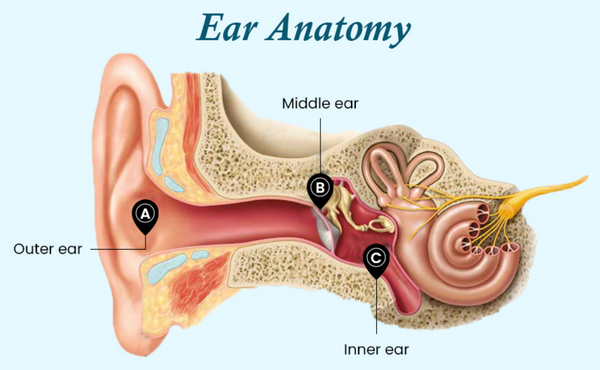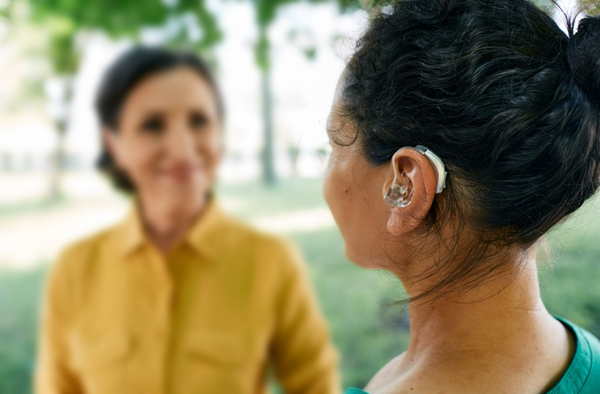Can Hearing Aids Cause Vertigo? Understanding the Link Between Hearing Loss and Dizziness
Navigation
- What Does Vertigo Feel Like? Recognizing the Symptoms
- What Triggers Vertigo? Common Causes and Risk Factors
- The Inner Ear: Your Sense of Balance
- Do Hearing Aids Cause or Worsen Vertigo?
- Managing and Treating Vertigo

Quick Answer
No, hearing aids do not cause or worsen vertigo. While vertigo is often related to inner ear problems, research shows hearing aids have no negative impact. Hearing aids may even help improve balance over time.
Introduction
Vertigo is an unpleasant sensation where you feel like you or your surroundings are spinning, rocking, or moving when there is no actual motion. It can cause nausea, loss of balance, and a feeling of disconnect from your environment. Vertigo is not a condition itself but rather a symptom of an underlying issue that causes a mismatch of signals in the inner ear or brain.
Since vertigo is often linked to inner ear problems, a common question is whether hearing aids can cause vertigo or make it worse. However, while hearing loss and vertigo often coexist, hearing aids themselves do not cause vertigo. Read on to understand more about the symptoms, causes, and treatments for vertigo, as well as the relationship between hearing aids and balance.
What Does Vertigo Feel Like? Recognizing the Symptoms

Vertigo has a distinct set of symptoms that set it apart from general lightheadedness or dizziness. People experiencing vertigo may report:
- A strong spinning sensation, as if you or the room are moving in circles
- Feeling off-balance, unsteady on your feet, or about to fall over
- Nausea or vomiting
- Nystagmus, or uncontrolled eye movements
- Headache or migraine symptoms
- Ringing in the ears (tinnitus)
- Muffled or distorted hearing
Vertigo episodes can last just a few seconds or continue for hours or longer, depending on the cause. The symptoms may come and go or occur in one prolonged, intense episode before fading. Vertigo can happen once or recur frequently.
What Triggers Vertigo? Common Causes and Risk Factors

While vertigo itself is a symptom, some frequent causes include:
1. Benign Paroxysmal Positional Vertigo (BPPV)
BPPV occurs when calcium carbonate crystals become dislodged in the inner ear. It causes vertigo triggered by position changes like tilting the head or lying down. BPPV is among the most common causes of vertigo.
2. Vestibular Neuritis
This inner ear infection causes inflammation along the vestibular nerve, disrupting balance signals from the inner ear to the brain. Prolonged vertigo is common with this viral infection.
3. Meniere's Disease
This inner ear disorder arises from fluid buildup and swelling. It causes severe vertigo along with tinnitus, muffled hearing, and ear pressure.
4. Vestibular Migraine
Vertigo can occur as part of a migraine headache. Vestibular migraines cause moderate to severe vertigo that may persist for days at a time.
5. Acoustic Neuroma
A non-cancerous brain tumor on the hearing and balance nerves can impair inner ear signals and lead to vertigo episodes.
The Inner Ear: Your Sense of Balance
To understand vertigo, it helps to know a little about the inner ear and its role in balance. Deep inside your ear are three fluid-filled semicircular canals lined with hair cells. These hair cells detect the rotation and movement of your head. They send signals through the vestibular nerve to the brain.
Your brain coordinates the inputs from both inner ears to maintain balance and spatial orientation. When one ear sends abnormal signals, or the brain can't reconcile mixed signals, it can trigger vertigo's sensation of spinning.
Do Hearing Aids Cause or Worsen Vertigo?

Many causes of vertigo affect the inner ear and can lead to some degree of hearing loss. So, you may wonder if adding a foreign device like a hearing aid could make vertigo worse.
However, research has not found any evidence that wearing hearing aids causes or contributes to vertigo. The latest digital hearing aids amplify sound through advanced processing, not pressure or vibration. As such, they have minimal physical impact on the delicate inner ear structures.
In fact, enhancing hearing input with hearing aids may improve balance over time in those with hearing impairment. The brain benefits from clearer, more consistent sound signals from both ears to recreate spatial awareness effectively.
Managing and Treating Vertigo

While hearing aids don't cause vertigo, effectively managing vertigo symptoms remains important, especially for active seniors. Severe vertigo increases fall risk. Key treatments depend on the cause:
- BPPV can improve through self-performed repositioning maneuvers. These help relocate the loose inner ear crystals.
- Vestibular neuritis and labyrinthitis may be treated with steroids to reduce inner ear inflammation.
- Medications, sound and balance therapy, or surgery can manage Meniere's disease and acoustic neuromas.
- Migraine and vertigo medications may help with vestibular migraines.
For recurring unexplained vertigo, doctors may order a VNG test or MRI to diagnose the cause. Managing anxiety and stress can also help reduce vertigo episodes.
Conclusion
Hearing aids do not cause or aggravate true vertigo, though some adjustment may be needed when first wearing hearing aids. Work with your doctor to determine if hearing aids could improve your hearing, and seek proper diagnosis and treatment for bothersome vertigo that interferes with your daily activities. Controlling vertigo helps ensure better mobility and independence.





